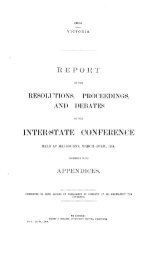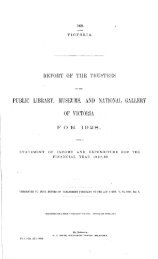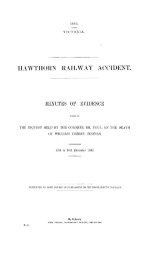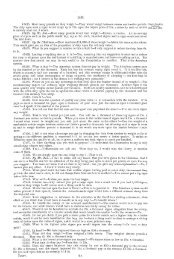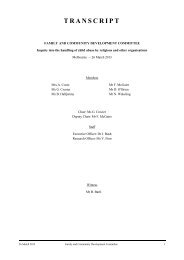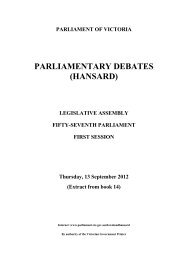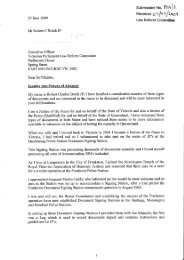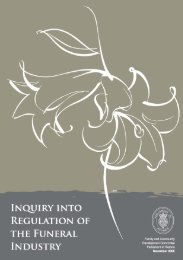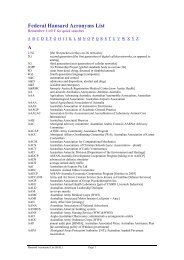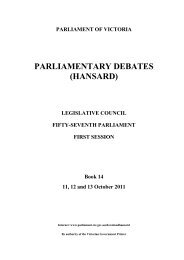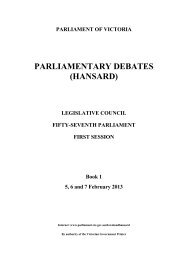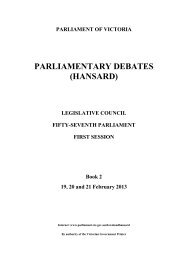Book 8 - Parliament of Victoria
Book 8 - Parliament of Victoria
Book 8 - Parliament of Victoria
You also want an ePaper? Increase the reach of your titles
YUMPU automatically turns print PDFs into web optimized ePapers that Google loves.
ENVIRONMENT PROTECTION AMENDMENT (LANDFILL LEVIES) BILL 2011<br />
1730 COUNCIL Thursday, 2 June 2011<br />
Second reading<br />
Ordered that second-reading speech be<br />
incorporated into Hansard on motion <strong>of</strong><br />
Hon. G. K. RICH-PHILLIPS (Assistant Treasurer).<br />
Hon. G. K. RICH-PHILLIPS (Assistant<br />
Treasurer) — I move:<br />
That the bill be now read a second time.<br />
Incorporated speech as follows:<br />
The Environment Protection Amendment (Landfill Levies)<br />
Bill augments <strong>Victoria</strong>’s landfill levies to help deliver better<br />
waste management and achieve the government’s goal <strong>of</strong><br />
making our cities more livable and sustainable.<br />
This bill will deliver on commitments made by the <strong>Victoria</strong>n<br />
government to work with local communities and support<br />
innovative recycling and resource-recovery projects.<br />
The new levy settings will create jobs, stimulate business<br />
growth and promote cleaner technologies. The revenues earnt<br />
will be reinvested in environmental actions and programs that<br />
are efficient, effective and present value for money for the<br />
<strong>Victoria</strong>n community.<br />
This bill and the associated reinvestments in waste reduction<br />
and other environment programs will help boost <strong>Victoria</strong>’s<br />
productivity and competitiveness in a global economy that<br />
increasingly values sustainability.<br />
<strong>Victoria</strong> already recycles 6 million tonnes <strong>of</strong> waste each year<br />
but an increase in the landfill levy will deliver even greater<br />
levels <strong>of</strong> resource recovery from the remaining 4 million<br />
tonnes still going to landfill.<br />
Every 10 000 tonnes <strong>of</strong> recycled material supports more than<br />
nine jobs, compared with less than three jobs supported by the<br />
same amount <strong>of</strong> material going to landfill.<br />
Increasing the levies will help <strong>Victoria</strong>ns send less waste to<br />
landfill and reduce the harms to local households and nearby<br />
businesses — including noise, dust and odour.<br />
It will render advanced recycling more viable and drive<br />
confident investment in better facilities that do not debilitate<br />
surrounding environments or upset local communities.<br />
Without this increase in levies, <strong>Victoria</strong> runs the risk <strong>of</strong><br />
stalling in our recycling, and foregoing greater economic,<br />
environmental and community benefits.<br />
In <strong>Victoria</strong>, generating waste and disposing <strong>of</strong> it into landfills<br />
is a very minor component <strong>of</strong> business and household costs,<br />
and remains cheap compared to other waste management<br />
solutions, such as recycling.<br />
As a consequence, the amount <strong>of</strong> waste generated statewide<br />
continues to increase and although recycling and resource<br />
recovery is also increasing, the absolute volume <strong>of</strong> waste<br />
going to landfill continues to climb.<br />
Yet over the years, <strong>Victoria</strong>n households and businesses have<br />
devoted effort to make a difference by introducing recycling<br />
into their daily routines — this bill will support their<br />
commitment.<br />
To provide greater certainty to businesses and government<br />
planning, the bill designates staged levy increments and sets a<br />
fixed trajectory for the coming four years.<br />
Recognising the difference in household and business cost<br />
factors between urban centres and rural <strong>Victoria</strong>, a difference<br />
between urban and rural landfill levy rates will be retained.<br />
The new levy will set appropriate incentives for waste<br />
reduction alternatives, and strike the right balance between<br />
greater recycling and limiting the burden on households and<br />
businesses.<br />
It will generate sufficient funding to support the important<br />
reinvestment <strong>of</strong> capital in environmental technology<br />
innovation and programs that will help improve <strong>Victoria</strong>’s<br />
environment, yet reflect governmental prudence and deliver a<br />
sustainable fiscal position.<br />
From 1 July 2011 the levy for every tonne <strong>of</strong> municipal<br />
(household and council) and commercial waste will increase<br />
by 10 per cent above the rates currently proposed for that<br />
year.<br />
Following these initial increases <strong>of</strong> 1 July 2011, the levies<br />
will progressively increase by approximately 10 per cent each<br />
year over the following three years, to 2014–15.<br />
Levy revenues will be reinvested in environmental actions<br />
and programs that are efficient, effective and provide value<br />
for money for the <strong>Victoria</strong>n community.<br />
In particular, the government is committed to making sure<br />
that waste programs and initiatives have sufficient funding to<br />
meaningfully secure the aims <strong>of</strong> the higher levies.<br />
This funding commitment will be directed to better waste<br />
outcomes for local government, businesses and commercial<br />
operators involved in reducing <strong>Victoria</strong>’s waste and capturing<br />
greater value from discarded resources.<br />
Funding will:<br />
support <strong>Victoria</strong>n businesses to dispose less waste to<br />
landfill;<br />
support innovators in the recycling industry and local<br />
government who are willing to invest early in better<br />
technologies, facilities and services;<br />
remove logistical and systemic obstacles to recovering<br />
commercial value from otherwise abandoned material;<br />
and<br />
finance value-for-money projects that produce<br />
meaningful and sustainable outcomes through the<br />
‘sustainability fund’.<br />
Key government agencies involved in waste management,<br />
recycling and resource efficiency will continue to assist all<br />
sectors <strong>of</strong> the community, especially businesses and local<br />
government, to reduce waste and improve resource use<br />
efficiency.<br />
These roles are vital to capture greater wealth from the<br />
materials passing through our economy and to protect local<br />
households, businesses and environments from the protracted<br />
problems created by less advanced waste management<br />
practices.



